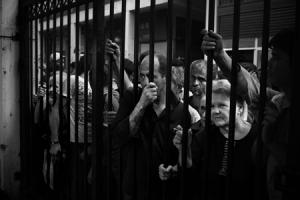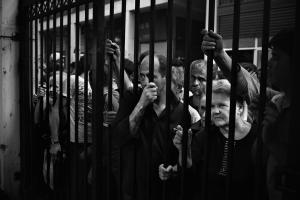
GRÉCIA, ONDE A CRISE ECONÓMICA CRIOU UMA CATÁSTROFE SOCIAL
Atenas é uma cidade condenada que não consegue esconder a miséria. As manifestações violentas tornaram-se frequentes. No centro histórico há fome, pessoas sem-abrigo e muitas seringas no chão. Perto da Praça de Omonia, no coração da cidade, encontra-se o desespero de quem tudo perdeu. Começaram por perder o emprego, perderam a esperança e muitos já perderam a dignidade. Resta-lhes aceitar a caridade da Igreja Ortodoxa grega ou o assistencialismo de um centro municipal que há muito deixou de conseguir responder a todos os pedidos de refeições diárias. Uma questão coloca-se: serão estes os famigerados que viveram acima das suas possibilidades? A resposta é óbvia, num país obrigado a viver desde 2009 com uma receita de sucessivas medidas de austeridade. BSC
x
Athens, the capital of Greece, is the epicentre of the crisis, and the place where the economical, human and anthropological consequences of this are more visible and obvious: hundreds of people daily...
moreAthens, the capital of Greece, is the epicentre of the crisis, and the place where the economical, human and anthropological consequences of this are more visible and obvious: hundreds of people daily...
moreAthens, the capital of Greece, is the epicentre of the crisis, and the place where the economical, human and anthropological consequences of this are more visible and obvious: hundreds of people daily line up to receive a free meal from a charity soup kitchen, about one third of the shops located in downtown were forced to close, and the number of homeless people dramatically increased, leading to the tragic outgrowth of other problems, such as the expansion of drug addiction, prostitution and serious diseases like tuberculosis and HIV. So far, the social tension in the city is showing no signs of decreasing, as proved by the more and more raging demonstrations against the Government policies, and the recurrent, cruel, racist attacks. BSC
x












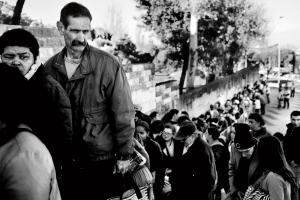
Portugal, a anti-democracia do empobrecimento
Em Maio de 2011, após uma grave crise financeira internacional, Portugal assinou um memorando de entendimento de políticas económicas e financeiras com a União Europeia, o FMI e o Banco Central Europeu. Ficou definido um plano de medidas de austeridade com o objectivo de controlar a dívida pública. O impacto de tais medidas resultou em três anos de recessão económica, e num aumento descontrolado da dívida pública em 130% do Produto Interno Bruto. Portugal, atingiu no primeiro trimestre de 2013 uma taxa de desemprego de 17,7%, e arrisca-se a ser um país europeu ainda mais periférico, em que dois milhões de pessoas vivem em risco de pobreza e 25,5% da população encontra-se em situação de privação material. A insensibilidade social, e a destruição económica provocada pelo “ajustamento interno” criou um exército de novos pobres que põe em causa a democracia e sustentabilidade do país. BSC
x
In May 2011, during a very serious international economic crisis, the Portuguese government signed a memorandum of agreement, for economic and financial policies, with the European Union, the...
moreIn May 2011, during a very serious international economic crisis, the Portuguese government signed a memorandum of agreement, for economic and financial policies, with the European Union, the...
moreIn May 2011, during a very serious international economic crisis, the Portuguese government signed a memorandum of agreement, for economic and financial policies, with the European Union, the IMF and the European Central Bank. A plan of austerity measures was defined with the purpose of controlling public debt. Three years of deep economic recession and an unrestrained rise of public debt up to 130% of the national GDP was the result of these resolutions. Portugal, which reached an unemployment rate of 17,7% in the first trimester of 2013, is now an even more peripheral European Union country, where two million people are estimated to be at risk of poverty and 25,5% of the population lives in a state of material privation. The lack of social sensitivity, and the economic catastrophe which followed this “internal adjustment”, created an army of “new poor” that puts in danger the democracy and sustainability of the country. BSC
x












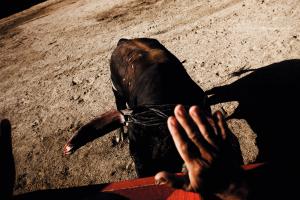
Capeia arraiana
A capeia arraiana é uma corrida de touros originária das terras de Ribacôa, aldeias da raia na fronteira com Espanha. Considerada património etnográfico, a capeia arraiana é conhecida por ser uma tourada com características únicas do mundo. É uma tradição com raízes ancestrais, que teve origem nos Forcalhos ou na Lageosa da Raia. BSC
x
The capeia arraiana is a traditional bullfight show, typical of the area of Ribacoa, a group of villages bordering Spain. Considered ethnographic heritage, it’s a “corrida” (bullfight)...
moreThe capeia arraiana is a traditional bullfight show, typical of the area of Ribacoa, a group of villages bordering Spain. Considered ethnographic heritage, it’s a “corrida” (bullfight)...
moreThe capeia arraiana is a traditional bullfight show, typical of the area of Ribacoa, a group of villages bordering Spain. Considered ethnographic heritage, it’s a “corrida” (bullfight) with unique characteristics. It’s a tradition with ancestral origins, which was born in Forcalhos or Lageosa da Raia. BSC
x
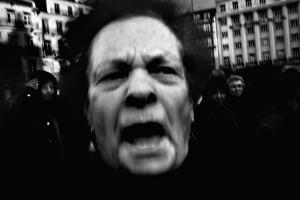
A troika foi embora, mas a austeridade ficou
No dia 17 de maio de 2014, Portugal abandonou o programa de resgate solicitado à troika (Comissão Europeia, Banco Central Europeu e Fundo Monetário Internacional). Após três anos de recessão e de uma consolidação orçamental fundamentada num programa de austeridade, o legado europeu de igualdade, direitos humanos e solidariedade foi descartado e os problemas agravaram-se. Um relatório das Nações Unidas confirma que a ajuda externa teve um impacto adverso nos direitos sociais, económicos e culturais, e alerta que o país encontra-se numa trajectória de subdesenvolvimento: Aumentou o risco de exclusão social, há mais crianças pobres e quem é pobre está mais longe de deixar de o ser. A austeridade veio para ficar. Portugal, de Janeiro a Agosto de 2014. BSC
x
On May 17 2014, Portugal abandoned the recovery program solicited to Troika (European Commission, Central European Bank and International Monetary Fund). After a 3-year recession and a fiscal consolidation...
moreOn May 17 2014, Portugal abandoned the recovery program solicited to Troika (European Commission, Central European Bank and International Monetary Fund). After a 3-year recession and a fiscal consolidation...
moreOn May 17 2014, Portugal abandoned the recovery program solicited to Troika (European Commission, Central European Bank and International Monetary Fund). After a 3-year recession and a fiscal consolidation based on an austerity program, the European legacy of equality, human rights and solidarity was discarded and the problems got worse. A report from the United Nations confirms that foreign aid has had an adverse impact on social, economic and cultural rights, and warned that the country is in a path of underdevelopment: The risk of social exclusion has increased, there are more poor children and who is poor is further away from ceasing to be. Austerity has come to stay. Portugal, from January to August 2014. BSC
x










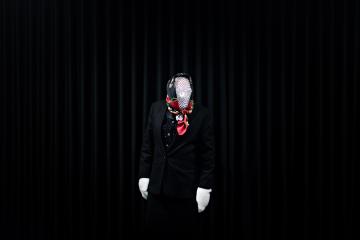
Lugares de silêncio
Os cumes montanhosos das serranias do Gerês estendem-se em tonalidades difusas e traços imprecisos para além da vista do horizonte. O vento corre no silêncio do espaço vazio e reconhece-se tudo a partir do halo físico emanado da massa sólida da criação original. É um lugar perfeito, a morada ideal, onde ultrapassamos a imperfeição da existência. Nesse espaço inteiro, as marcas da milenar ocupação humana revelam-se desapercebidas na tela da paisagem – a ruína de um muro, o vestígio de um caminho. É então que se dá a transmutação de um estado sublime para a contingência da nossa humanidade. E a palavra faz-se carne e passa a habitar entre nós.
A partir desse vislumbre de imperfeição, transpomos a concepção da natureza como unidade diferenciada, matéria-prima a partir da qual a vida dos homens é construída. Como em Marx, ela está em “interacção metabólica” com o homem. A natureza produz homens, e os homens transformam a natureza. Gente que molda a paisagem; a paisagem que molda a gente. Até que, no transcorrer silencioso do tempo, gente e paisagem se fazem unidade.
Esta transacção faz-se visível com a descida aos povoados. Nas práticas de transumância, na vida com os animais, no cultivo dos campos, nos usos do espaço da casa e da rua. São modos de viver e habitar o mundo em declínio devido a novas ordens de relação social e económica.
Desse modo de viver, que não mais faz parte do presente, podemos registar apenas um simulacro. Uma memória que nunca poderá ser memória autêntica, porque esse passado que foi não volta a ser. Dele resta apenas o que é no tempo presente, os seus sinais, os seus traços. É aí que se radica o acto de criação, pela acção voluntária de encontro com as próprias origens, pela relação íntima e desapegada de si com os outros, pela completa imersão na experiência do tempo presente. Para mergulhar nessas águas que abundam em toda a área do Parque, indispensáveis à vida e à fixação do homem, e voltar ao princípio original de todas as coisas.
Bruno Simões Castanheira
Abril 2017
x
The hilly tops of the Gerês mountain range unfold in hazy tones and foggy contours well beyond the horizon. Wind runs in the silence of the empty space and one starts to recognise what is through...
moreThe hilly tops of the Gerês mountain range unfold in hazy tones and foggy contours well beyond the horizon. Wind runs in the silence of the empty space and one starts to recognise what is through...
moreThe hilly tops of the Gerês mountain range unfold in hazy tones and foggy contours well beyond the horizon. Wind runs in the silence of the empty space and one starts to recognise what is through the physical hale of the solid mass – the mass of the utter beginning, the original creation. It is the perfect place, the ideal home, where the very imperfection of existence is far gone. In this wholesome space, the marks of the thousand year old human presence are gently revealed in the canvas of the landscape – a wall in ruin, the remnant of a footpath. The moment of transmutation occurs – from the sublime to the contingency of our humanness. And the word turns to flesh and now lives in our midst.
From the slight sight of imperfection we look beyond the conception of nature as a differentiated unity – the raw-material from which human life is built henceforth. As in Marx, it is in “metabolic interaction” with Man. Nature produces Man, and Man transforms Nature. People that shape the landscape; the landscape that shapes people. And then, in the silent passing of time, people and landscape become one.
This exchange becomes visible in the descent towards the villages. In the practices of transiency, in the co-existence with animals, in the tillage of the fields, in the use of the home-space and the street. These are ways of life and of inhabiting the living world bound to a declining path on the trail of profound economic and social transformations.
In this way of life, parted from the present times, we can only hold a simulacrum. A memory that can never be an authentic memory, for that past that was will be no more. What is left of it now is what it is this very day, its signs and faded lines. And there lies the act of creation – in the self-willing meeting with the origins, in the intimate and detached relation of one with the others, in the complete immersion into the experience of a present time. To plunge into the Park’s abounding waters – essential to life and to the settlement of Man – and return to the original beginning of all living things.
Bruno Simões Castanheira
April 2017
x















































